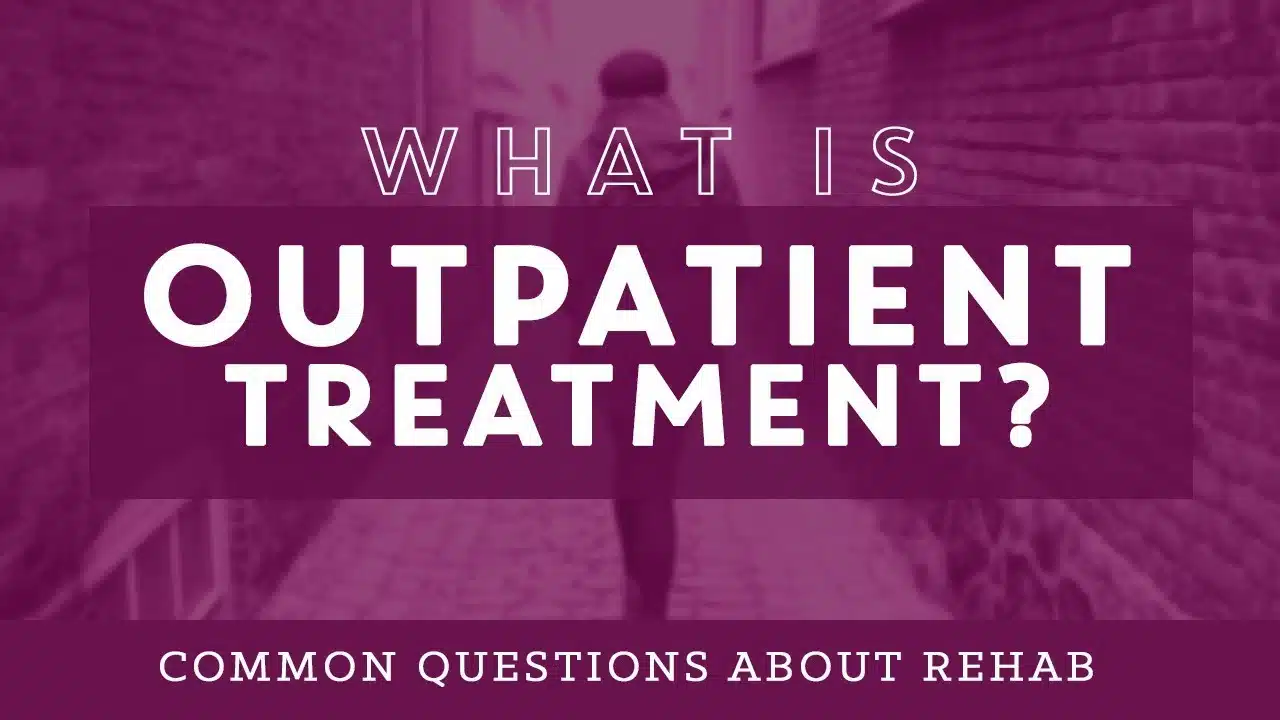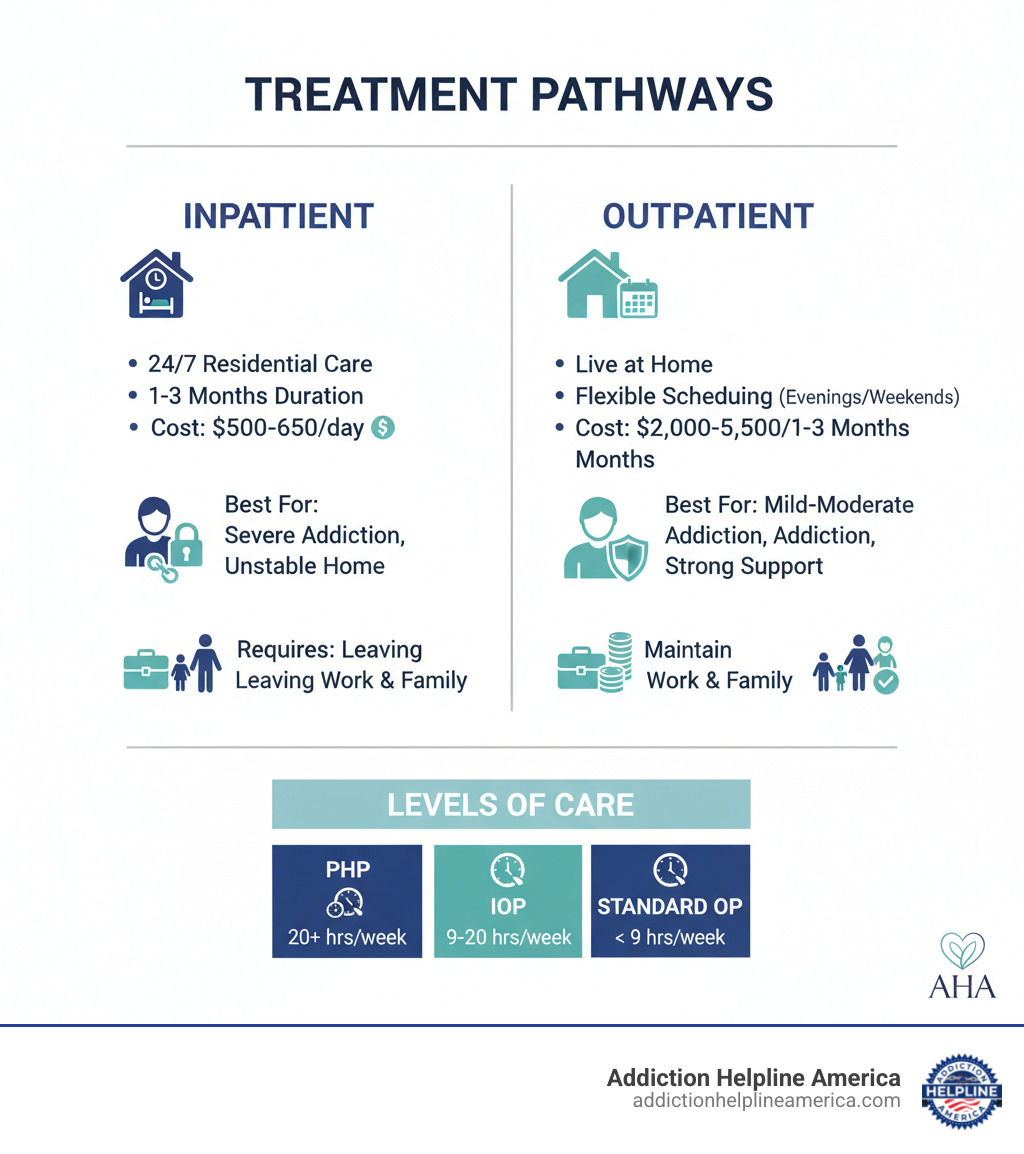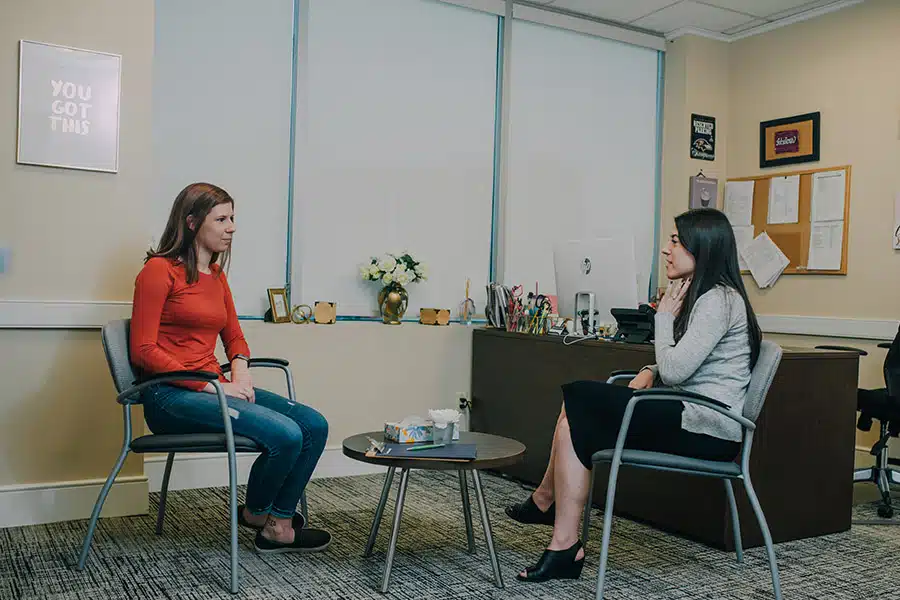
Understanding Your Path to Recovery While Living at Home
Outpatient drug treatment is a flexible form of addiction care that allows you to receive professional help for substance use disorders while continuing to live at home and maintain your daily life.
Quick Overview:
- What it is: Treatment you attend during scheduled sessions while living at home.
- Time commitment: Ranges from less than 9 hours per week (standard outpatient) to 20+ hours (partial hospitalization).
- Who it’s for: People with mild to moderate addiction, strong support systems, or transitioning from residential care.
- Cost: Typically $2,000-$5,500 for 1-3 months (significantly less than inpatient care).
- Key benefit: Maintain your job, family responsibilities, and daily life while getting help.
Outpatient treatment offers the structure you need without requiring you to leave your home. You don’t have to choose between recovery and your responsibilities. Programs typically include individual counseling, group therapy, and evidence-based treatments like Cognitive Behavioral Therapy. You attend sessions at scheduled times—mornings, evenings, or weekends—then return home to practice your recovery skills in real-world situations.
The treatment intensity varies. Partial Hospitalization Programs (PHP) provide the most intensive care (20+ hours weekly), Intensive Outpatient Programs (IOP) offer 9-20 hours per week, and Standard outpatient care involves fewer than 9 hours weekly for maintaining long-term recovery.
At Addiction Helpline America, we help individuals and families steer the complexities of outpatient drug treatment. Our team can connect you with appropriate programs and provide support throughout your recovery journey.

Outpatient drug treatment terms to remember:
Understanding Outpatient Drug Treatment: What It Is and Who It’s For
When you choose outpatient drug treatment, you’re selecting a path that integrates professional help with your daily life. You attend therapy and recovery activities at a treatment facility and return home each night. The treatment schedule is built around your life, not the other way around.
Unlike residential care, outpatient treatment does not involve 24-hour supervision. This structure allows you to build recovery skills and immediately apply them in your daily environment—at your job, with your family, and in your community. This immediate application can be incredibly powerful, as you learn a coping strategy one day and practice it the next when stress arises.
Outpatient care is typically recommended for people with mild to moderate substance use disorders who are not at high risk for dangerous withdrawal symptoms. It’s also an excellent step-down for those transitioning from residential treatment. The ideal candidate has a strong support system, a stable and safe living environment, and genuine motivation to recover, as the model requires discipline and commitment.

Key Benefits of Outpatient Care
- Flexibility for Work and School: Programs often schedule sessions during mornings, evenings, or weekends so you can maintain your job or education.
- Lower Cost: Without the expense of room, board, and 24/7 staffing, outpatient programs are significantly more affordable than inpatient options.
- Real-World Application: You face actual triggers and stressors while building your recovery toolkit, which builds confidence and proves that recovery works in your daily life.
- Family Involvement: Loved ones can participate in family therapy and learn how to best support your journey, making recovery a shared experience.
- Privacy and Responsibility: Outpatient care offers discretion, allowing you to manage personal obligations and keep your recovery as private as you choose.
Is Outpatient Treatment Right for You?
Determining if outpatient drug treatment is right for you requires an honest assessment. Key factors include:
- Medical Safety: Outpatient care is suitable if you have a low risk of severe withdrawal. If you face potentially dangerous withdrawal symptoms (e.g., from alcohol or benzodiazepines), medical detox is necessary first. Our Detox Near Me Guide can help you understand your options.
- Motivation: High motivation for recovery is essential. You are responsible for attending sessions and avoiding substances between appointments.
- Support and Logistics: A safe, supportive home life and reliable transportation to the facility are critical for success.
Call Now – Your Journey to Recovery Begins Today!

Take the first step towards a healthier life! Call now to connect with our compassionate team and start your recovery journey today. Your path to healing awaits!
Our recovery specialists are available 24/7 to provide support, and all calls are confidential and free. Reach out anytime – we’re here to help!
If you’re uncertain, a healthcare professional can assess your needs. Our Find Right Rehab Facility Guide can also help you steer this decision. At Addiction Helpline America, we’re here to listen and connect you with programs that match your needs.
Types of Outpatient Drug Treatment Programs
Outpatient drug treatment is not a one-size-fits-all solution. Programs are offered at different intensities, known as “levels of care,” as part of a “continuum of care model.” This flexible system allows you to step down to a less intensive program as you progress or step up to receive more support if you face challenges. The goal is to provide the right amount of support at the right time to prevent gaps in treatment and promote long-term success.

Partial Hospitalization Programs (PHP)
Partial Hospitalization Programs (PHPs) are the highest level of outpatient drug treatment. Also known as “Day Programs,” they require a significant time commitment, typically 20 or more hours of treatment per week, spread across 5 to 7 days. The structure of a PHP mirrors inpatient care—with individual counseling, group therapy, and educational workshops—but you return home each evening. PHPs are ideal for those transitioning from residential treatment or for individuals who need intensive support without 24-hour medical supervision.
Intensive Outpatient Programs (IOP)
Intensive Outpatient Programs (IOPs) balance a serious treatment commitment with real-world flexibility. IOPs typically require 9 to 20 hours of treatment per week over 3 to 5 days. Many facilities offer morning and evening groups to accommodate work, school, or family responsibilities. As you meet recovery milestones, the weekly time commitment may decrease, rewarding your progress while ensuring you receive adequate support. IOPs are perfect for those who need more than standard outpatient counseling but must maintain their daily routines. For more details, visit our Intensive Outpatient Drug Rehab Programs page.
Standard Outpatient Programs (OP) & Continuing Care
Standard Outpatient Programs (OPs) are the least intensive level of outpatient drug treatment, involving fewer than 9 hours of care per week, often just one or two sessions. These programs are vital for long-term recovery, focusing on relapse prevention, skill development, and addressing ongoing life challenges. This level of care is also where “continuing care” or “aftercare” becomes central. Continuing care refers to ongoing support services after completing a more intensive program, such as regular counseling or participation in mutual-help groups like AA or NA. Research shows that people who participate in continuing care have significantly better long-term outcomes. If you need help with alcohol use, our Help for Alcoholics page offers additional resources.
The Outpatient Treatment Journey: From Engagement to Long-Term Recovery
Recovery from a substance use disorder is a journey with different phases. Outpatient drug treatment is designed to support you through each one, adapting as you grow stronger. Research consistently shows that the duration and intensity of treatment significantly impact long-term success. Building a life free from substances takes time, practice, and consistent support.

The Continuum of Care Model Explained
The continuum of care model, developed by the American Society of Addiction Medicine (ASAM), is a compassionate framework that recognizes everyone’s needs change over time. Outpatient treatment falls within this continuum, primarily at Level I (standard outpatient) and Level II (IOP/PHP). The model’s effectiveness lies in its seamless transitions. You can step down to a less intensive program as you progress or step up for more support if you face challenges. As SAMHSA’s advisory on CLINICAL ISSUES IN INTENSIVE OUTPATIENT TREATMENT FOR SUBSTANCE USE DISORDERS – Advisory 47 notes, these successful transitions are critical to positive long-term outcomes.
Stages of an Outpatient Drug Treatment Program
Your journey through outpatient drug treatment typically unfolds in four stages:
- Stage 1: Treatment Engagement. This initial phase focuses on stabilizing crises and building a commitment to recovery. It’s about establishing trust and laying the foundation for change.
- Stage 2: Early Recovery. Lasting from six weeks to three months, this stage is about developing essential skills to stay sober, such as practical coping mechanisms and trigger identification.
- Stage 3: Maintenance. Lasting from two months to a year, this stage deepens your commitment by practicing advanced relapse prevention skills, improving emotional well-being, and building sober social networks.
- Stage 4: Community Support and Aftercare. This long-term stage involves continuing recovery within the community through resources like mutual-help groups (AA/NA) and periodic follow-up sessions. Recovery is a lifelong process supported by a strong aftercare plan.
How Long Does Outpatient Rehab Last?
The length of outpatient drug treatment varies based on the severity of the SUD, co-occurring conditions, and individual progress. While there is no one-size-fits-all timeline, research consistently shows that longer durations of care lead to better outcomes. Common program lengths are 30, 60, or 90 days, with many experts recommending a minimum of 90 days for the intensive phase. Standard outpatient care may initially last around 60 days, with long-term follow-up sessions. We offer various program lengths to meet your needs, including 30 Day Outpatient Rehab Programs and 60 Day Outpatient Rehab Programs. The goal is to build a sustainable, sober life, which is worth taking the time to do right.
What to Expect: Services, Therapies, and Specialized Programs
Outpatient drug treatment provides a comprehensive healing environment designed to treat the whole person—addressing physical, mental, emotional, and social well-being. You’ll find a full spectrum of services chosen to support your unique recovery journey.

Core Services and Therapies Offered
The foundation of outpatient treatment rests on a variety of evidence-based services:
- Individual Counseling: Provides a safe, one-on-one space with a therapist to address the root causes of addiction and develop personal coping strategies.
- Group Therapy: Creates a sense of community with peers who understand your struggle, allowing you to share experiences, learn from others, and practice new skills.
- Family Counseling: Helps repair relationships, improve communication, and educate family members on how to support your recovery effectively.
- Evidence-Based Behavioral Therapies: These are research-proven methods. Common therapies include:
- Cognitive Behavioral Therapy (CBT): Helps you recognize and change negative thought patterns and behaviors linked to substance use.
- Motivational Interviewing: Helps you find your own internal motivation for change, which is useful for those feeling ambivalent about recovery.
- The Matrix Model: A highly structured approach for stimulant addiction, combining multiple therapeutic elements.
- Twelve-Step Facilitation Therapy: Encourages engagement with peer support programs like Alcoholics Anonymous (AA) or Narcotics Anonymous (NA).
- Medication-Assisted Treatment (MAT): Combines FDA-approved medications (like buprenorphine or naltrexone) with counseling to manage cravings and withdrawal symptoms for opioid or alcohol use disorders.
- Ancillary Services: Many programs offer additional support like case management, vocational training, life skills education, and wellness programs.
To learn more, watch this discussion on the role of therapy in addiction treatment.
Specialized Outpatient Programs
Specialized programs are designed for specific demographic groups or circumstances to ensure care is relevant and culturally competent.
- Men’s and Women’s Programs: Provide gender-specific environments to discuss sensitive topics like trauma, relationships, and societal pressures. See our Mens Rehab Centers Complete Guide.
- LGBTQ+ Affirming Care: Offers a welcoming environment that addresses unique stressors and trauma related to identity.
- Programs for Veterans: Acknowledge specific challenges like combat trauma and reintegration difficulties.
- Court-Ordered Treatment: Serves individuals referred by the criminal justice system, providing structured care that satisfies legal requirements.
- Co-occurring Disorders Treatment: Integrates care for both a substance use disorder and a mental health condition like depression or anxiety. Our Rehab Center for Depression Guide has more information.
- Programs for specific populations like homeless individuals or pregnant women often bundle treatment with essential support like housing assistance or prenatal care.
Paying for Outpatient Drug Treatment
We understand that financial concerns can feel overwhelming, but outpatient drug treatment is an investment in your future, and help is more accessible than you might think. There are multiple payment avenues available to make recovery affordable.
Call Now – Your Journey to Recovery Begins Today!

Take the first step towards a healthier life! Call now to connect with our compassionate team and start your recovery journey today. Your path to healing awaits!
Our recovery specialists are available 24/7 to provide support, and all calls are confidential and free. Reach out anytime – we’re here to help!
Average Costs and Payment Options
Outpatient drug treatment costs significantly less than residential care. A 1-3 month outpatient program typically ranges between $2,000 and $5,500 total, compared to inpatient programs that can cost $500-$650 per day.
If that amount feels out of reach, other options are available:
- Sliding Scale Fees: Many facilities adjust costs based on your income.
- State-Funded Programs: Government-funded programs provide affordable or free treatment for eligible individuals.
- Grants and Scholarships: Non-profits and treatment centers may offer financial awards.
- Financing Plans: Some facilities offer in-house financing to spread payments over time.
For a complete breakdown of your options, visit our Paying for Addiction Treatment page.
Using Insurance for Outpatient Drug Treatment
Most insurance plans help cover the costs of outpatient drug treatment, thanks to federal laws like the Affordable Care Act (ACA) and the Mental Health Parity and Addiction Equity Act (MHPAEA). These laws require insurers to provide mental health and substance use disorder benefits that are comparable to their medical benefits.
The first step is to verify your benefits with your insurance provider to understand your plan’s coverage, including deductibles and co-pays.
- Medicare Part B covers a range of outpatient services for substance use disorder treatment at various facilities, including hospitals and community mental health centers.
- Medicaid also covers substance use disorder treatment services in all states. If you are eligible for both (dual eligible), you may have even broader coverage.
We recommend calling your State Medical Assistance (Medicaid) office to learn about specific services covered in your state. Don’t let financial worries stop you from reaching out—treatment is more accessible than many people realize.
Frequently Asked Questions about Outpatient Drug Treatment
It’s natural to have questions when choosing a treatment path. Here are answers to some of the most common questions we hear about outpatient drug treatment.
What’s the main difference between inpatient and outpatient rehab?
The primary difference is where you live. Inpatient rehab requires you to live at the facility 24/7, providing a highly structured, supervised environment. It is best for those with severe substance use disorders or an unstable home life.
With outpatient drug treatment, you live at home and attend scheduled sessions at a facility. This offers the flexibility to continue with work, school, and family life. It is ideal for those with mild to moderate addiction and a strong support system.
Neither option is universally “better”; they serve different needs.
Can I work while attending an outpatient program?
Yes, this is a primary benefit of outpatient drug treatment. Most Intensive Outpatient Programs (IOPs) and standard Outpatient Programs (OPs) are designed for working people, with sessions scheduled in the evenings, mornings, or on weekends. This allows you to balance a job with your treatment schedule.
Partial Hospitalization Programs (PHPs) are more intensive (20+ hours/week) and may be difficult to balance with a full-time job, though some employers offer flexibility or you may be able to use medical leave.
What happens if I relapse during outpatient treatment?
Relapse is not failure. It is a common part of the recovery process for many people. If you relapse, the most important step is to be honest with your counselor immediately. Your treatment team is there to help, not judge.
When a relapse occurs, your treatment plan will be re-evaluated. This might mean increasing your therapy sessions, trying a new type of therapy, or adjusting medication. In some cases, you may need to temporarily step up to a higher level of care (e.g., from IOP to PHP) for more intensive support.
A relapse is a learning opportunity that can provide valuable information about your triggers and help strengthen your long-term recovery.
Conclusion: Taking the First Step Towards Recovery
We hope this guide has shown you that outpatient drug treatment is a powerful and flexible pathway to recovery that honors your life and responsibilities. You don’t have to put your life on pause to get the help you deserve. Outpatient care offers the professional support necessary for lasting change while keeping you connected to your home, family, and work.
With its adaptable levels of care—from intensive PHPs to maintenance-focused OPs—and comprehensive services, outpatient treatment addresses you as a whole person. These programs are also significantly more affordable than residential care, and options like insurance, sliding scale fees, and state-funded programs make treatment accessible.
Call Now – Your Journey to Recovery Begins Today!

Take the first step towards a healthier life! Call now to connect with our compassionate team and start your recovery journey today. Your path to healing awaits!
Our recovery specialists are available 24/7 to provide support, and all calls are confidential and free. Reach out anytime – we’re here to help!
Taking the first step is crucial, and you are not alone. If you or a loved one is ready to explore treatment, resources are available now. You can find support options at FindSupport.gov. If you or someone you know is in crisis, call or text 988 to reach the free and confidential Suicide Crisis Lifeline, available 24/7.
At Addiction Helpline America, we provide free, confidential, personalized guidance to help you Find the right substance abuse treatment program for you. Our team will listen to your situation and connect you with facilities in our network that fit your needs. Your journey to a healthier, sober life can begin with a simple phone call. We’re ready when you are.
Our helpline is 100%
free & confidential
If you or someone you care about is struggling with drug or alcohol addiction, we can help you explore your recovery options. Don’t face this challenge alone—seek support from us.
Programs
Resources
Will my insurance
cover addiction
treatment?
We're ready to help
Find the best
drug or alcohol treatment
center
Are you or a loved one struggling with addiction? Call today to speak to a treatment expert.















